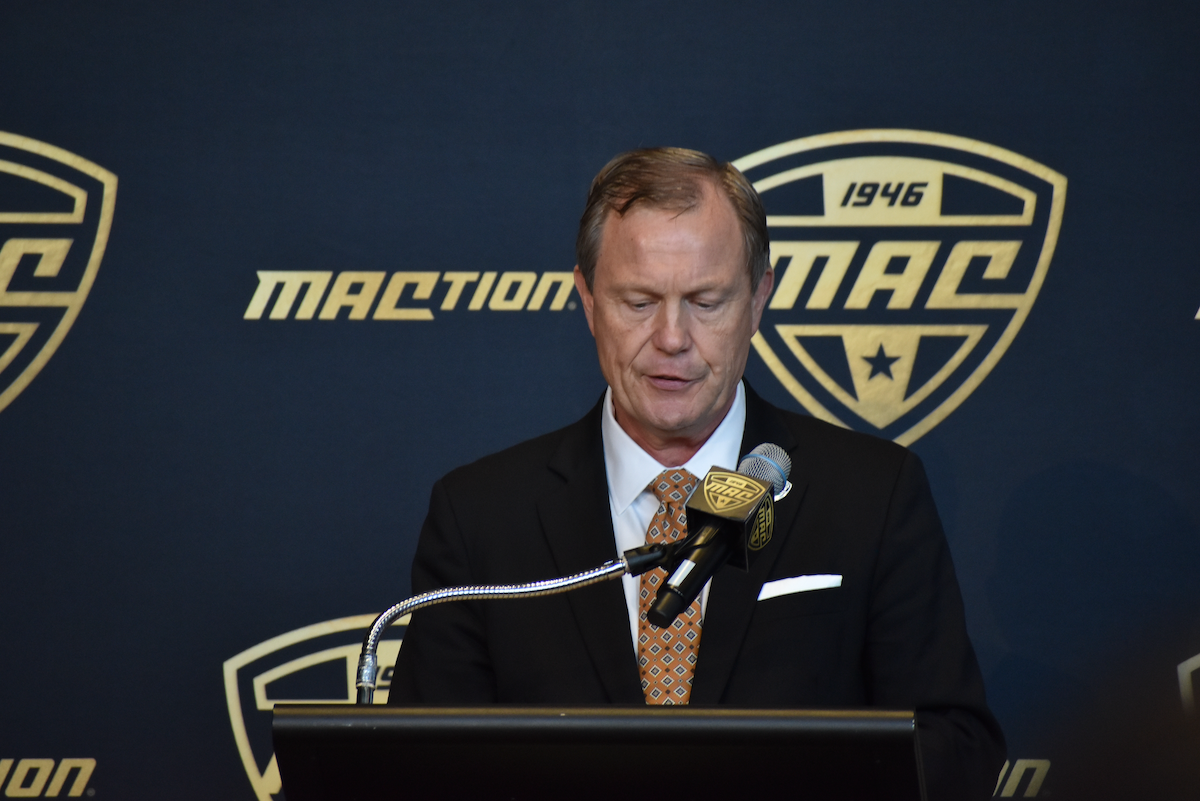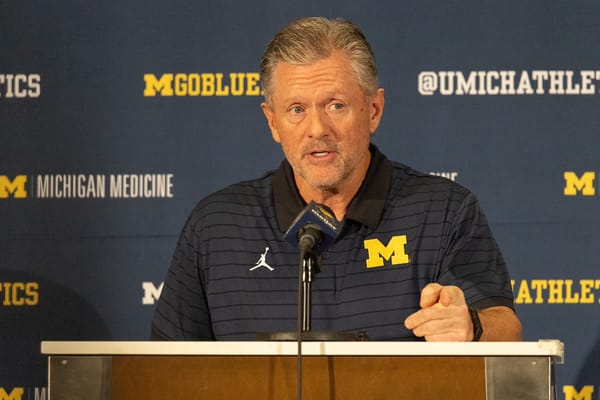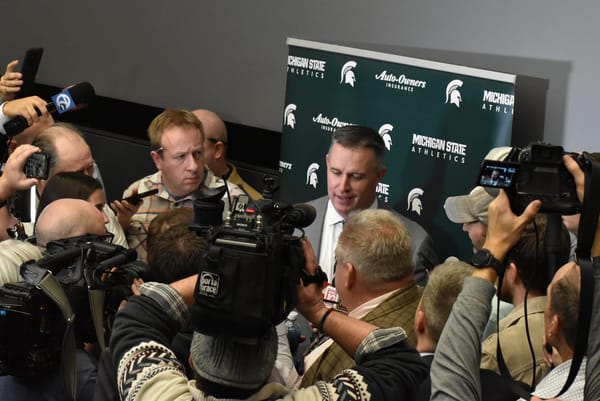Sci-fi, Pink Floyd and Congress: Highlights from Jon Steinbrecher’s MAC media day address
Steinbrecher addressed a number of major topics in college sports, and how the MAC fits in the picture.

Detroit — Mid-American Conference commissioner Jon Steinbrecher might as well be a stranger in a strange land.
A college athletics lifer, now leading a third conference and in his fourth decade as a league commissioner, Steinbrecher sees a world of college sports that’s almost entirely morphed since he took over the MAC in 2009. In the 15-plus years Steinbrecher’s held his position the College Football Playoff (which has itself been tinkered with repeatedly) superseded the BCS, conference realignment repeatedly shuffled the deck in the FBS and the monied realities of Division I college athletics finally pierced the shield of amateurism: Players are getting paid now. And with the settlement in the House v. NCAA case going into effect this summer, schools can now directly pay athletes a share of revenues.
It’s a new world, but Steinbrecher is undeterred. He’s bullish on the MAC’s ability to carve out a space in the new world of college football. He also addressed the MAC’s stance on expanding the College Football Playoff further and how college athletics and the MAC will adapt to a post-House world of college sports. And while the MAC and its member schools might get overlooked as people discuss the future of college football, at large, Steinbrecher seemed clear on one point: It will not get left behind.
To illustrate his point, Steinbrecher leaned on a quote from American science fiction writer Robert A. Heinlein, author of Starship Troopers and Stranger in a Strange Land, who himself could be an avatar for Steinbrecher.
Born in western Missouri a few months before Oklahoma became the 46th U.S. state, Heinlein joined a world that changed at a rapid pace around him. One world war was fought by the time he was a teenager and by the time he left the United States Navy as a lieutenant in 1934, Europe was already careening toward the next. A man born less than four years after the Wright Brothers took off from the sands of Kill Devil Hills would, two weeks after his 52nd birthday, watch Neil Armstrong descend a ladder from a capsule and walk on the moon.
So in making sense of a world that is far, far different from the one he grew up or even started his career in, it’s not surprising that Steinbrecher opted for a quote from Heinlein.
“Always listen to experts. They will tell you what cannot be done and why. Then do it,” Steinbrecher said, quoting the famed author.
The House settlement is a beginning, not an ending
All of the members of the MAC are opted in to revenue sharing — something borne from the House settlement — for 2025-26, meaning athletes on various teams at respective MAC schools will get paid from their own school.
And while this shift represents a massive change for the complexion of college athletics, Steinbrecher noted it’s not an end point.
“The settlement is neither good nor bad,” Steinbrecher said. “It is. It is simply a framework for providing an evolving set of guidelines and guardrails to guide us in the emerging economic opportunities for student athletes. Currently the rules around NIL and additional benefits are still being developed, as are the mechanisms to oversee those rules.”
At the head of overseeing the rules and administering the enforcement mechanisms will be the newly-formed College Sports Commission, headed by Bryan Seeley, a former federal prosecutor and MLB executive in the league office.
Much of what Seeley and his still-coming-into-form team are tasked with policing is evident and fairly concrete, like teams complying with the revenue sharing cap and roster limits. They are also going to take on more complex and harder-to-pin-down goals, like monitoring third-party deals for athletes and ensuring money for an athletes name, image or likeness isn’t just boosters trying to circumvent the revenue sharing cap with cushy NIL deals.
Seeley recently met with the athletic directors of MAC schools, Steinbrecher said, as the CSC is seeking input from around college sports as it starts work in earnest.
No matter what the CSC does, though, Steinbrecher also thinks federal legislative intervention is needed.
Enter: The SCORE Act, or Student Compensation and Opportunity through Rights and Endorsements Act.
While still just a bill (sitting on Capitol Hill), the SCORE Act, AKA House resolution 4312, is a piece of legislation designed to further codify in federal law how college sports can and cannot operate with respect to NIL, antitrust law and employment, among other things. Introduced by Rep. Gus Bilirakis (R-Florida), the bill has yet to land a co-sponsor but has advanced through committee.
Steinbrecher, who himself has been to Washington D.C. several times in the last year to lobby Congress, seemed optimistic about the potential for the SCORE Act or similar legislation, though didn’t take a specific stance on it.
“This bill is well worth serious reflection, as we need federal assistance in balancing these economic issues and educational outcomes,” Steinbrecher said.
More generally, he’s encouraged that engaged members of Congress on both sides of the aisle want to address how college sports fits within United States labor law.
“Congressional assistance is necessary if we are to establish a unified NIL standard and have legal protections to develop and enforce eligibility rules that promote academic success,” Steinbrecher said.
And relatedly, Steinbrecher is not willing to sever the educational component of college athletics, i.e. athletes being students working toward degrees to be eligible.
What needs to be struck, he said repeatedly, is a balance between economic opportunity for athletes and those athletes still obtaining degrees.
“I recently heard a couple of media talking heads say that college athletes should not have to go to class and that the athlete should just focus on playing and they could come and get a degree another time,” Steinbrecher said. “I can think of several colorful adjectives, I'll just say: Wrong.”
The whole thing had Steinbrecher reaching for an entirely different pop culture reference.
“The response that comes to mind is from the lyrics from a Pink Floyd song, and it's, quote, 'I am comfortably numb,'” Steinbrecher said.
CFP expansion is fine, with proper conditions
In 10 years of the College Football Playoff, the MAC has not had a team in the field. The closest any team came was likely Western Michigan going 13-1 in 2016.
So it’s not a surprise that Steinbrecher is open to the idea of the playoff expanding from its current 12-team format to 14 or even 16 teams. But, in a way where it’s not just about big, name brand teams getting in.
The current format of the College Football Playoff is for 12 teams, with the top four seeds getting byes and seeds No. 5-8 hosting seeds No. 9-12 at home site playoff games. The CFP tweaked the selection and field-setting criteria for 2025, so the five highest-ranking conference champions still get in the field but are not guaranteed a top seed. This means the teams ranked No. 1-4 by the committee will get the byes, regardless of conference champion status. If the fifth highest-ranked conference champion is lower than 12th, it will take the No. 12 seed and the team ranked No. 12 will miss out on an at-large spot.
Future potential models for 14- and 16-team playoffs propose a similar paradigm, where the five highest-ranking conference champions get automatic bids and the other teams are picked on an at-large basis. Other models that have been floated favor the likes of the Big Ten and SEC, with multiple automatic bids for the top teams in those leagues. For the MAC, the former is likely acceptable while the latter is not.
“Staying at 12 teams, under the current format, would be a perfectly acceptable outcome,” Steinbrecher said. “The Mid-American Conference is interested in 14 or 16 teams, but the details are important. Unlike the CFP revenue distribution, which draws heavily from past performance and brand, selection for the CFP should be forward facing, honoring conference champions and non-champions that had exemplary years.”
And as someone who was around during the BCS era, Steinbrecher warned of the need for credibility in how one of the most popular American sporting championships is shaped.
“History informs us that if we tinker with the event too much, credibility in the event, which is the second-most popular sports championship in the country behind only the Super Bowl, is at risk,” Steinbrecher said. “And considering the future, we should not forget the lessons from the past.”
Strength in numbers
As conferences continue to stratify and the SEC and Big Ten pull away from the pack financially, Steinbrecher spoke with a note of caution about a further fragmenting college sports landscape, particularly at the FBS level and among autonomy and non-autonomy conferences.
(Quick definition: Autonomy conferences — SEC, Big Ten, ACC, Big 12 — are the rich, big ones that make choices which cause the non-autonomy leagues, like the MAC, to react accordingly.)
And Steinbrecher’s message, overall, was that the autonomy conferences needn’t jettison the non-autonomy conferences just to get a bigger piece of the pie.
He pointed to the NFL, where the teams compete on the field but work collaboratively off it to enhance the business for all parties. To wit, the league revenue share payout to clubs from national revenue last year was $432.6 million, according to Green Bay Packers’ financial records (the Packers are the only publicly traded team in the league).
“Moving forward, it is becoming more and more clear that the path for success forward is less fragmentation, more collaboration among all of us,” Steinbrecher said. “Certainly among the 10 FBS and certainly among the five or six non-autonomous FBS. NCAA governance is one area in which this makes perfect sense. But there are many, many others, especially economic leaning areas, where we're all going to win if we compete on the field but collaborate in the board room.”
Whether SEC commissioner Greg Sankey or Big Ten commissioner Tony Petitti will hear that message remains to be seen.



